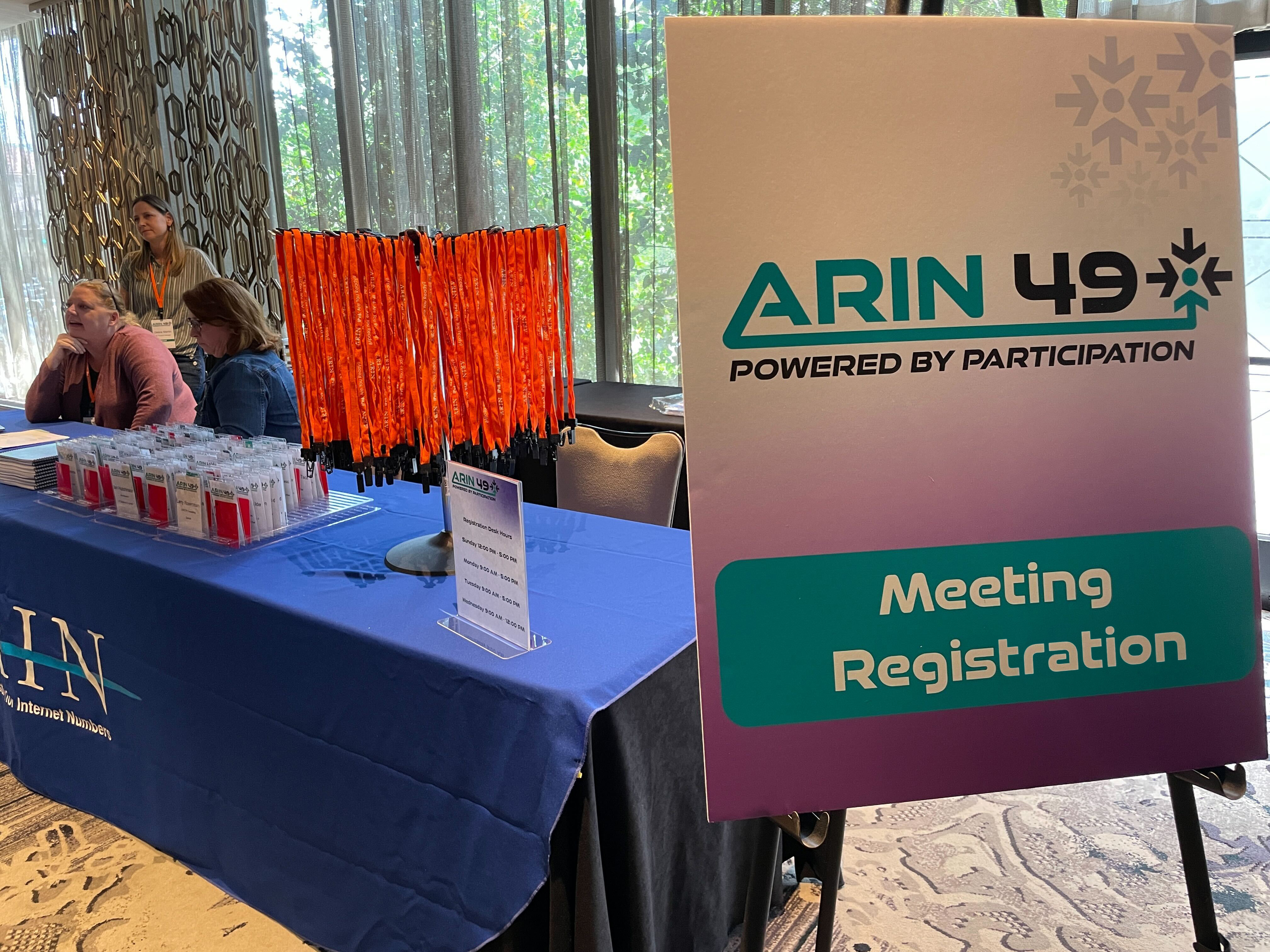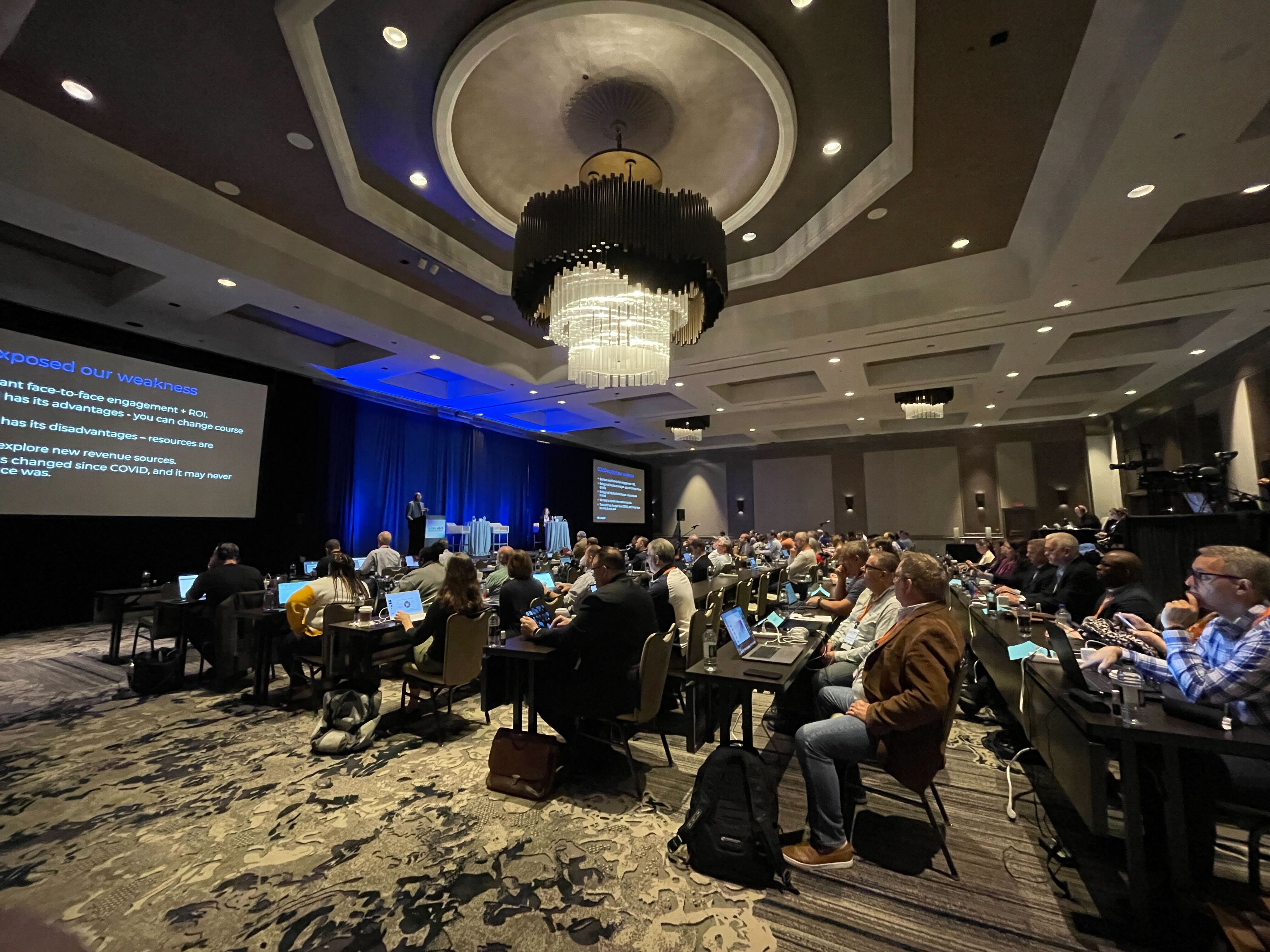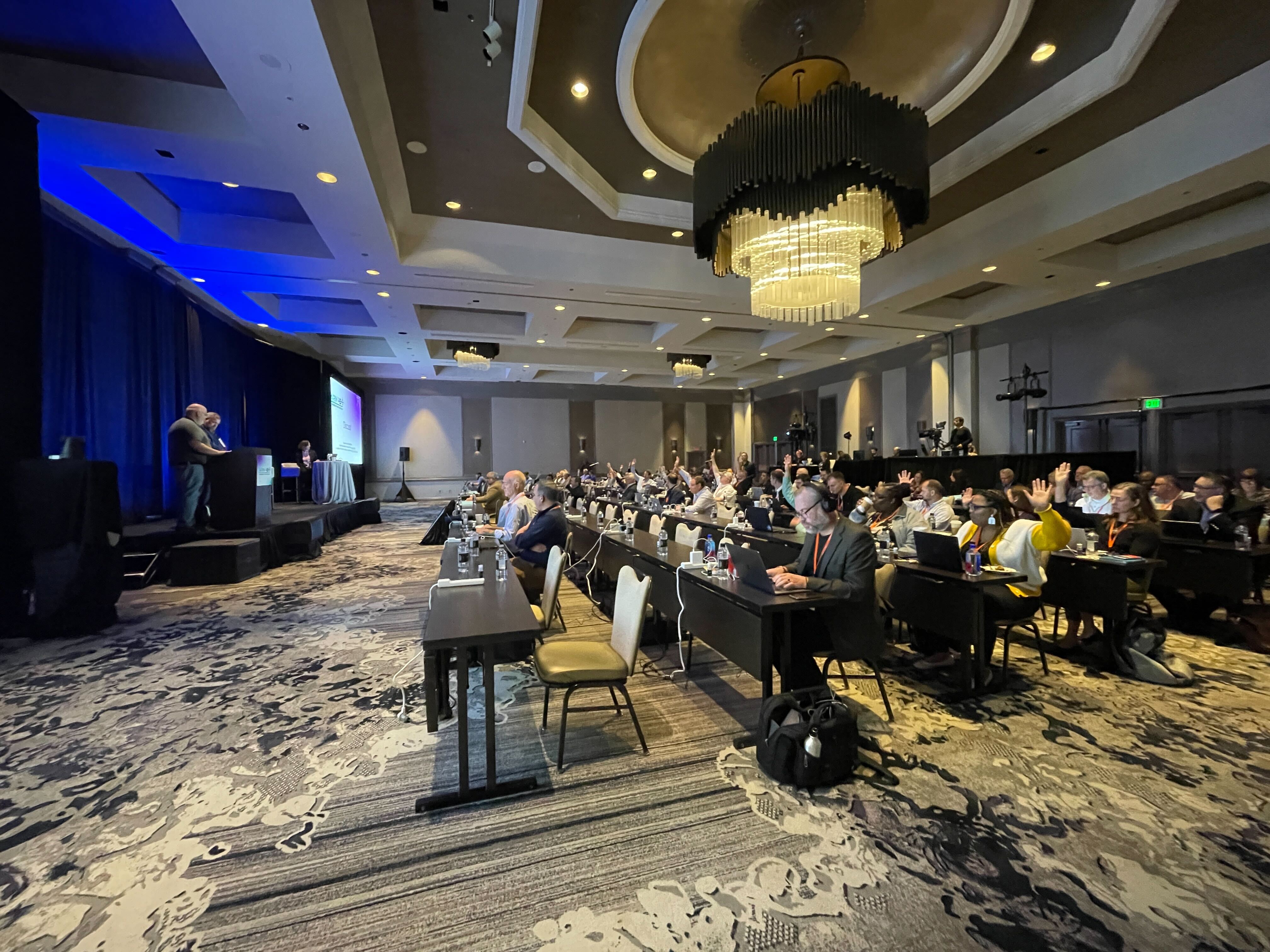
ARIN 49 Day 1 Daily Recap
Coming to you live from Music City — Nashville, Tennessee — the hybrid ARIN 49 Public Policy and Members Meeting has officially begun! We’re excited to welcome both new and familiar faces to join us for a great lineup of policy discussions, organizational updates, and plenty of opportunities to get reacquainted since our last meeting. Stay tuned for a high-level overview of what happened so far at ARIN 49.
RPKI ROAthon
To start, yesterday marked our first Resource Public Key Infrastructure (RPKI) ROAthon at an ARIN meeting where on-site participants had a chance to get hands-on experience with creating Route Origin Authorizations (ROAs) to enhance the routing security of their Internet number resources. Senior Product Owner of Routing Security Brad Gorman walked attendees through the steps to use ARIN’s hosted RPKI, including key pairs and ROA creation. After the ROAthon, attendees greeted one another at an onsite Happy Hour that provided a great opportunity to catch up. And don’t worry, virtual participants, we welcome you to join us for a Virtual Happy Hour after day two of the meeting concludes tomorrow.

Day 1 Morning
Bright and early this morning, Hollis Kara, Director of Communications, kicked off the first official day of the meeting with opening announcements and a quick review of the meeting agenda and format. We are pleased to see that interest in the full hybrid experience is being widely utilized this week with a significant number of both remote and in-person participants. Next, John Curran, President and CEO, and Bill Sandiford, Board of Trustees Chair, gave opening remarks that included a warm welcome to all attendees.
NANOG Executive Director Edward McNair provided a NANOG Update focused on the theme of adapting to a changing world that looked at how the organization has evolved since the start of the COVID-19 pandemic. Then John Sweeting, Chief Customer Officer (CCO), gave a Policy Implementation and Experience Report that examined the eligibility criteria for IPv4 address space issued via the ARIN Waiting List and legacy number resource statistics that indicate Legacy Registration Services Agreement (LRSA) adoption spiked recently in Q1 2022.

Presenting the AC Docket Report, Leif Sawyer, Advisory Council (AC) Chair, summarized the policy activity since our last meeting, proposals received, and items that will be on the docket over the next couple of days. I was up next with an overview of the ARIN Community Grant Program and adjustments that have been made to the program since last year. Past project reports are available on the ARIN blog, and the call for applications is now open through 2 June 2022. I encourage you to apply if you have a project you think would be a good fit.
Next up, Mark Kosters, Chief Technology Officer, explained the growing problem of brute force login attacks that are almost always highly distributed and coming from many disparate blocks from both IPv4 and IPv6 space. These attacks are overwhelming our checks/monitoring for database connections, drive up Central Processing Unit (CPU) utilization, and incurring engineering and customer costs. Operational mitigation strategies have been put in place and improvements to customer mitigation strategies are being explored. You will be seeing a community consultation on requiring two-factor authentication (2FA) for all customer accounts that are associated with resources in the near future. After taking questions from the queue, Mark then rolled right into a report from the Engineering Department that highlighted recent statistics, software releases, operational improvements, challenges, and what’s next.
Policy Block
During today’s policy discussions, Advisory Council members presented each policy and then opened the floor for community members to provide input on the following draft and recommended draft policies:
- Draft Policy ARIN-2020-6: Allowance for IPv4 Allocation “Swap” Transactions via 8.3 Specified Transfers and 8.4 Inter-RIR Transfers - Presented by Rob Seastrom, Advisory Council
- Recommended Draft Policy ARIN-2021-3: Private AS Number and Unique Routing Policy Clarifications - Presented by Chris Tacit, Advisory Council
- Recommended Draft Policy ARIN-2021-4: Clarifications to Sections 8.3, 8.4 and 8.5.6 - Presented by Alyssa Quinn, Advisory Council
- Draft Policy ARIN-2021-6: Permit IPv4 Leased Addresses for Purposes of Determining Utilization for Future Allocations - Presented by Andrew Dul, Advisory Council

Lunch and Virtual Table Topics
Then we broke for lunch and virtual attendees had the option to gather on Zoom to discuss interesting topics in breakout rooms (and, in case you were wondering, in person attendees will have a chance to join table topic discussions on site during tomorrow’s lunch). The table topics sessions included:
- Routing Security with Brad Gorman, Senior Product Owner, Routing Security
- CCO Feedback with Joe Westover, Senior Manager, Office of the CCO
- IP Address Leasing with Alison Wood, Advisory Council
- Internet Governance and International Political Conflict with Alyssa Quinn, Advisory Council
- Simplifying the Number Resource Policy Manual (NRPM) with Chris Tacit, Advisory Council
- Improving Policy Discussion and Participation with Anita Nikolich, Advisory Council
Day 1 Afternoon
After a delicious lunch and a stretch break, Einar Bohlin, VP of Government Affairs, kicked off the afternoon with an update on Government Affairs. He covered the team’s area of focus, Caribbean affairs, law enforcement and public safety, some very interesting points related to international Internet regulation, and plans for 2022. Recently, ARIN responded to the United States Federal Communications Commission (FCC) Request for Comments on Secure Internet Routing by noting that they should be sure to consider comments from Internet service providers (ISPs) and network operators. Next up, Senior Policy Analyst Sean Hopkins provided a glimpse of recent policy proposals from each of the other Regional Internet Registries (RIRs): AFRINIC, APNIC, LACNIC, and the RIPE NCC.
John Sweeting then presented an IPv4 update which took a look at IPv4 coverage under a Registration Services Agreement (RSA), IPv4 Waiting List growth, reserved pools, IPv4 /24s transfers, and IPv6 networks issued and created. John then moved into a services update that detailed the new Premier Support Plan (PSP) introduced in 2021. In an effort to increase our customer-centric approach, the PSP recognizes the core significance of holders of the largest number of resources to both ARIN and the community, and a new fee-based version of the program will be available to all members in Q3 2022.

Next, Hollis Kara gave a Communications Department Report reviewing what has happened over the past few months in terms of content development, community engagement, social media, and the blog. Be on the lookout for a new advanced RPKI training soon, and later this year we’re excited to celebrate ARIN’s 25th anniversary and 50th meeting. If you’d like to share a story that could be used to commemorate these milestones, let us know about a favorite memory you have from an ARIN meeting over the past 25 years.
Then, after a short break, Richard Jimmerson, Chief Operating Officer, shared an Operations Update that highlighted organization staff and services. ARIN currently employs approximately 90 staff and the 2022 work plan is fully engaged. We continued to make enhancements to ARIN Online and internal tools to facilitate customer service as demand for registry services continues to grow. Keep an eye out for an upcoming membership survey so we can learn about your preferences for ARIN service development priorities.
Next Paul Wilson, Number Resource Organization (NRO) Executive Council Chair, gave an NRO Update, and Kevin Blumberg, NRO Number Council Chair, updated us on the ICANN Address Supporting Organization Address Council (ASO AC). Rounding out the day, John Sweeting provided an Internet Number Status Report, and Leif Sawyer gave an Advisory Council Report with emphasis on examining how we can remove barriers to participating in policy development.
Then we paused for a moment for community members to bring any questions or comments on any topic during an Open Microphone session hosted by John Curran and Bill Sandiford. Questions hit on topics from RPKI and the FCC filing to retirement of the NONAUTH Internet Routing Registry (IRR), IPv6 sparse allocations, and vetting demonstrated IPv4 need. Wrapping up the day, John Curran closed with final announcements and adjournment.
See You Tomorrow
If you would like to refer to anything have seen so far, all slides from today have been posted online on our ARIN 49 Meeting Materials page, and, over the next few days, we’ll also add links to the full transcript and webcasts to this page as well.
Please be sure to use the #ARIN49 hashtag on social media when sharing about your meeting experience, and we’ll see you back here tomorrow for day two of ARIN 49.
Recent blogs categorized under: Public Policy
GET THE LATEST!
Sign up to receive the latest news about ARIN and the most pressing issues facing the Internet community.
SIGN ME UP →Blog Categories
ARIN Bits • Tips • Updates • Elections • Caribbean • Outreach • Security • RPKI • Public Policy • Guest Post • Grant Program • Fellowship Program • Data Accuracy • IPv6 • Business Case for IPv6 • Internet Governance • Training • IPv4 • Customer Feedback • IRR


